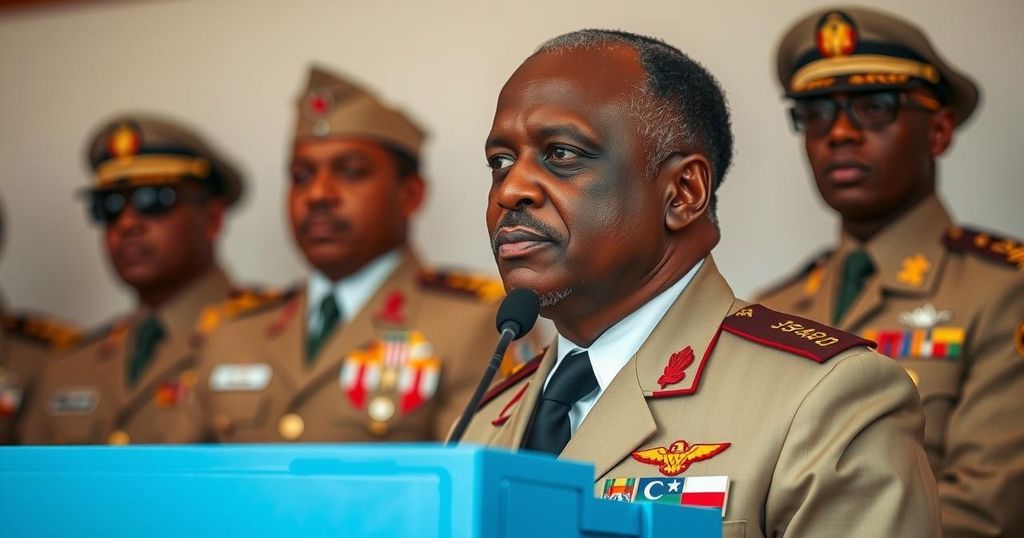Chad Holds Elections Amid Opposition Boycotts and Allegations of Fraud
Chad held elections for legislative, provincial, and local offices after three years of military rule, dominated by candidates allied with Marshal Mahamat Idriss Itno due to opposition boycotts. Allegations of electoral fraud have surfaced, and the atmosphere is marred by security threats from Boko Haram and a repressive media environment. The elections are presented as a step towards democratic governance, despite significant public skepticism.
Chad held legislative, provincial, and local elections on Sunday, marking what the government describes as the final phase of a political transition following three years of military governance. However, these elections are being largely boycotted by opposition parties, allowing candidates aligned with Marshal Mahamat Idriss Itno—who ascended to power in 2021 following the military’s intervention—to dominate the electoral landscape. The credibility of the electoral process is further undermined by accusations of electoral fraud and manipulation perpetrated by the ruling party.
Opposition leader Succes Masra, in a live social media broadcast, urged voters to boycott, declaring, “It is better to stay at home,” while condemning the overarching system as rife with deception. Masra alleged that election results have already been predetermined, asserting that “the fabricated results are already in the computers.” Additionally, the Democratic Party of the Chadian People (PDPT) reported the disappearance of over a thousand ballots intended for Bongor, underscoring their call for vigilance against potential fraud operations orchestrated by the ruling party.
Polling activities ran from 6 am to 6 pm (0500 to 1700 GMT), engaging approximately eight million registered voters, who were monitored by a hundred foreign observers and representatives from various political factions. Voting commenced earlier for security personnel and migratory groups. The elections take place amid ongoing security challenges posed by the insurgency of Boko Haram in the Lake Chad region, alongside tension regarding military dealings with former colonial ruler France and claims of Chad’s involvement in the conflict in neighboring Sudan.
Marshal Itno, who took charge following the death of his father, Idriss Deby Itno, in 2021, advocates these elections as essential for restoring democratic governance. His father ruled Chad with an oppressive regime for thirty years. The last legislative elections in Chad occurred in 2011, with subsequent elections delayed due to jihadist threats and public health crises such as the coronavirus pandemic. A transitional parliament comprising 93 members was established under Itno’s presidential decree in 2021, but assertions of increasingly authoritarian governance have arisen from the opposition camps, particularly in light of violent crackdowns on protests in October 2022.
As the electoral process unfolds, most independent media outlets remain silent due to a strike by online journalists protesting government restrictions on press freedom and the withholding of subsidies crucial for covering the elections. Despite efforts by the ruling party to generate public enthusiasm, voter participation may reflect broader disillusionment with the current regime.
Chad has experienced significant political turbulence since the military coup that brought Marshal Mahamat Idriss Itno to power in 2021 after the death of his father, former President Idriss Deby Itno. Following years of military rule, the current government has positioned recent elections as a pivotal step toward democratic transition. However, widespread opposition boycotts, accusations of electoral fraud, and a repressive political environment threaten the legitimacy of these electoral processes. Additionally, the current geopolitical context and internal security challenges further complicate Chad’s political landscape.
In summary, Chad’s recent elections represent a crucial juncture in its political evolution, marked by a boycott from opposition groups and serious allegations of electoral fraud. The dominant ruling party, under Marshal Mahamat Idriss Itno, faces significant public discontent and accusations of oppressive governance. Moreover, the restrained media environment and external threats underscore the complexities surrounding this electoral event, challenging claims of a genuine transition towards democratic practices in Chad.
Original Source: www.barrons.com




Post Comment